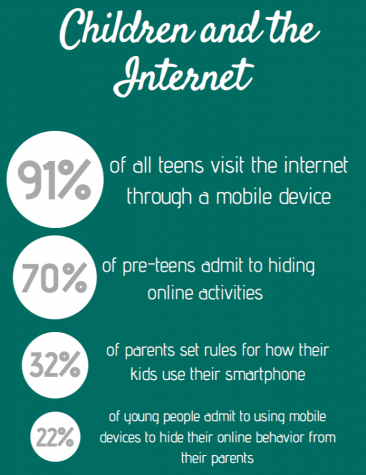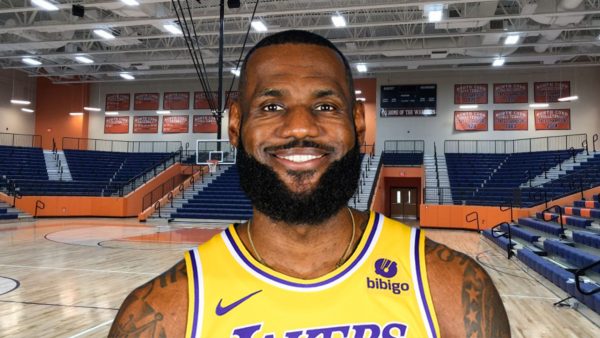Looking over your child’s shoulder won’t hurt
October 16, 2018
On average, a child receives his first cell phone when he reaches 12 years old, and 91% of kids aged 13 to 17 with cell phones can access the Internet on them. With the majority of children open to the limitless world of the Internet, these children need protection from what seems like the greatest—yet scariest— birthday present of all.
When a child searches for nearly anything on any kind of search engine, results with similar tags or name can come up. The Internet supplies limitless options for educational purposes, but also inappropriate responses for underage eyes.
“I definitely worry about this a lot with my youngest [child]. He he has an iPad and I am always looking over him like a hawk because he doesn’t really know what trouble he can get into,” mother Rebecca Keaton said.
While searching for something as innocent as “My Little Pony” or wandering curiously on Google, a little kid can easily stumble upon the wrong website or video on a smartphone, laptop, or tablet. When children constantly pull up pornography, especially from a young age, it can affect one’s sexual beliefs and attitudes. While kids remain curious, viewing pornography online can result in harmful behavior that may stunt a child’s views on relationships and make sex seem less valuable.
Almost 80% of unwanted exposure to pornorgraphy occurs in the safety of a child’s own home. Parents should understand how and why Internet access should remain monitored to prevent this explicit exposure from occuring.

Source: http://www.growingwireless.com/get-the-facts/quick-facts
When children receive smartphones or tablets at a young age, they quickly expose themselves to the multiple social media apps and sites available online. 89% of all teens use some type of social media platform. Social media includes sites such as Instagram, Snapchat, Twitter, or any kind of site that provides a chat room. These sites allow kids to say anything or show anything to anyone who friends them. Nearly half of teens say that they regret posting at least one item on their social media accounts.
Cyberbullying, a rising problem within the social media community, occurs on all social media platforms and can increase anxiety and depression in teens. Children can hide their identities on social media accounts by using aliases, allowing them to make rude comments without revealing their true identity.
“Of course I worry about social media; it’s not that I don’t trust my children, I don’t trust the crazy strangers out there lurking on the Internet,” Keaton said.
While also exposed to cyberbullying, a child who creates their own Instagram, Snapchat, or Twitter account opens themselves to hidden predators who can view posts and circumnavigate privacy efforts. When a child makes their account private, a sexual predator can hide their identity by changing their profile picture and biography on their profile to look like a younger child seeking friendship.
Exposed to hidden predators, bullying, and inappropriate content, children need protection from this tool so they can use their smartphone or computer safely. Parents should know the dangers of the Internet as well as the benefits and act on their parameters.
Children can benefit from parents creating a welcoming environment where they can talk about their curiosities to encourage them from roaming the limitless internet. Talking out loud about the dangers of the Internet can make children squirm, but will also make them more aware of what dangerous content sits in their palm daily. Parents who initiate more conversation about sex and pornography with their children will find them wondering on their own about the subject less.
Parents and guardians can also use different applications on tablets and phones to prevent explicit content from appearing and monitor social media and text messaging.
MamaBear, an app that send updates on social media and text messages as well as location sharing, allows parents to keep up with the whereabouts of their child on foot and on the Internet. This app, compatible with Android and iOS, also offers an ad-free version for $15 a month.
Qustodio, compatible with Windows, Mac OS X, Android, iOS, Kindle, and Nook, allows parents to not only look out for cyberbullying on a child phone, but can block text messages from numbers. Qustodio can also balance a child’s screen time and control the applications downloaded on a device. Qustodio provides three different plans: small plan to protect up to five devices ($54.95 per year), medium plan to protect up to ten devices ($96.95 per year), and a large plan to protect up to 15 devices ($137.95 per year).
Parents can also benefit from child blocks on different Internet platforms such as Google’s parental lock and also any kind of streaming site’s parental lock. These sites can block inappropriate content from a screen and blur it from the screen.
“I definitely recommend monitoring apps for a child phone because it’s not them that is doing wrong, it’s the technology. They need protection for what they think is so cool because they don’t know what it will do to them in the future,” Keaton said.
Although adding more surveillance on children’s technology may seem like an overbearing invasion of privacy, children will benifit in the future from parents keeping a closer watch on electronics. If parents look to keep children safe by adding these apps on a child’s device, children will remain less at risk of stumbling upon inappropriate content on the Internet.
While the Internet can create many dangers for younger children starting to explore the Internet, it also remains as a valuable educational tool. The Internet can benefit everyone when used safely and monitored by a responsible mentor.


















